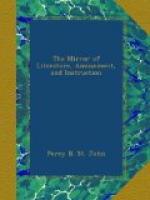Influence of Convict Labour.
Little more than forty years ago this country was an absolute waste. By way of contrast, behold, in the parts first settled, the following proofs of wealth: a thriving capital, and several interior towns, the latter being larger and better constructed than the capitals of some English settlements in America, a hundred years after their foundation; excellent roads; productive turnpikes; crowded market-places; public hotels, superior to the best in North America, even at this late hour; warehouses, through which there is a constant flow of luxuries from all parts of the world; public carriages, almost as well managed as those of England; an astonishing number of private carriages, built in Long Acre; several newspapers, and other periodical works; booksellers’ shops, well supplied from Europe; two banks of deposit and discount; many churches and chapels; very good schools for rich and poor; scientific, literary, and philanthropic societies; a botanical garden; a turf club; packs of hounds; dinner parties, concerts and balls; fine furniture, plate, and jewels; and though last, not least, many gradations in society, being so many gradations in wealth.
Whence have come all those things, over and above mere subsistence, which astonish the beholder, when he reflects that this colony has been planted little more than forty years?
An example has just passed my window, in the shape of a dashing English landau. It contains a “lady,” who married a poor half-pay lieutenant, and who now drinks tea that would cost in England twenty shillings the pound. They emigrated to New South Wales in 1815. But how did she get that carriage, and how does she manage to send to China for the gunpowder? Thus:—Her husband is both landowner and merchant. Being constantly supplied with a number of convict labourers, he breeds cattle and cultivates grain; and as he gives to his labourers but just enough for their subsistence, he has a large surplus produce. Having sold to the local government wheat and beef for the supply of prisons, hospitals, and barracks, he is paid partly with bills upon the English treasury, and partly with dollars, sent from England for the support of the great penitentiary. He remits one of those bills to his London agent, and desires him to purchase, with the proceeds thereof, a superb landau. In less than a year, his wife “rides in her coach.” He sends some of the dollars to Canton, and purchases therewith a cargo of tea, of which he gives to his wife as much as she likes, and sells the rest to the wives of other men, who pay him with bills or dollars, received again from the government for wheat and beef. Thus, you see, Mrs. —— is indebted for two decided proofs of wealth to the prevalence of crime in England. Even the coat of arms on her landau was found by your Herald’s College, in return for a part of the proceeds of that bill, which was drawn to pay for the food of the soldiers who drove the convicts, who produced the food. Our old friend Sir George Nayler would no doubt start at being told of his obligation to the pickpockets of London. And the rogues are little aware of their influence in political economy; but I have stated a plain fact, which, if you have any doubts about it, pray submit both to Sir George himself, and to Mr. M’Culloch.




